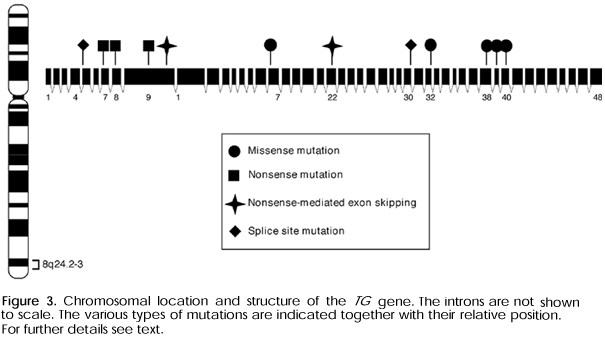Congenital hypothyroidism affects about 1:3000-1:4000 infants. Screening programs now permit early recognition and treatment, thus avoiding the disastrous consequences of thyroid hormone deficiency on brain development. In about 85%, congenital hypothyroidism is associated with developmental defects referred to as thyroid dysgenesis. They include thyroid (hemi)agenesis, ectopic tissue and thyroid hypoplasia. Thyroid dysgenesis is usually sporadic; in only 2% it occurs in a familial fashion. It can be caused by mutations in transcription factors that are essential for the development and function of thyroid follicular cells. Thyroid hypoplasia can also result from resistance to TSH at the level of the thyrocytes. Defects in the steps required for thyroid hormone synthesis within thyroid follicular cells are referred to as dyshormonogenesis and account for about 10-15% of congenital hypothyroidism. In contrast to thyroid dysgenesis, affected patients typically present with goitrous enlargement of the thyroid. The defects leading to dyshormonogenesis typically display a recessive mode of inheritance. Careful clinical, biochemical and molecular analyses of patients with syndromic and non-syndromic forms of thyroid dysgenesis and dyshormonogenesis have significantly enhanced our understanding of the wide spectrum of pathogenetic mechanisms underlying congenital hypothyroidism and provide unique insights into the (patho)physiology of thyroid development and hormone synthesis.
Thyroid dysgenesis; Dyshormonogenesis; Congenital hypothyroidism; Thyroglobulin



